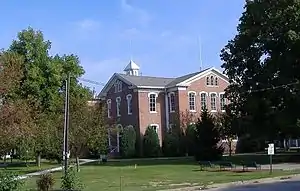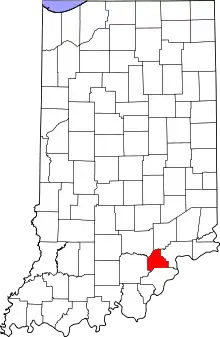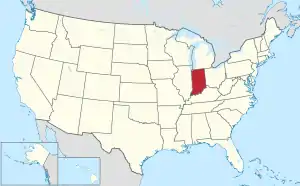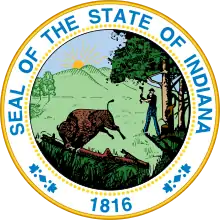Scott County, Indiana
Scott County is a county located in the U.S. state of Indiana. As of 2010, the population was 24,181.[1] The county seat is Scottsburg.[2]
Scott County | |
|---|---|
 Scott County Courthouse in Scottsburg, Indiana | |
 Location within the U.S. state of Indiana | |
 Indiana's location within the U.S. | |
| Coordinates: 38°41′N 85°44′W | |
| Country | |
| State | |
| Founded | 1820 |
| Named for | Charles Scott |
| Seat | Scottsburg |
| Largest city | Scottsburg |
| Area | |
| • Total | 192.75 sq mi (499.2 km2) |
| • Land | 190.40 sq mi (493.1 km2) |
| • Water | 2.35 sq mi (6.1 km2) 1.22%% |
| Population | |
| • Estimate (2018) | 23,878 |
| • Density | 127/sq mi (49.04/km2) |
| Time zone | UTC−5 (Eastern) |
| • Summer (DST) | UTC−4 (EDT) |
| Congressional districts | 6th, 9th |
| Indiana county number 72 | |
History
Scott County was formed in 1820 from portions of Clark, Jackson, Jefferson, Jennings, and Washington counties. It was named for Gen. Charles Scott, who was Governor of Kentucky from 1808 to 1812.
Geography
According to the 2010 census, the county has a total area of 192.75 square miles (499.2 km2), of which 190.40 square miles (493.1 km2) (or 98.78%) is land and 2.35 square miles (6.1 km2) (or 1.22%) is water.[3]
Cities and towns
Adjacent counties
- Jennings County (north)
- Jefferson County (east)
- Clark County (south)
- Washington County (west)
- Jackson County (northwest)
Major highways
Climate and weather
| Scottsburg, Indiana | ||||||||||||||||||||||||||||||||||||||||||||||||||||||||||||
|---|---|---|---|---|---|---|---|---|---|---|---|---|---|---|---|---|---|---|---|---|---|---|---|---|---|---|---|---|---|---|---|---|---|---|---|---|---|---|---|---|---|---|---|---|---|---|---|---|---|---|---|---|---|---|---|---|---|---|---|---|
| Climate chart (explanation) | ||||||||||||||||||||||||||||||||||||||||||||||||||||||||||||
| ||||||||||||||||||||||||||||||||||||||||||||||||||||||||||||
| ||||||||||||||||||||||||||||||||||||||||||||||||||||||||||||
In recent years, average temperatures in Scottsburg have ranged from a low of 20 °F (−7 °C) in January to a high of 87 °F (31 °C) in July, although a record low of −32 °F (−36 °C) was recorded in January 1977 and a record high of 109 °F (43 °C) was recorded in July 1930. Average monthly precipitation ranged from 2.84 inches (72 mm) in February to 4.75 inches (121 mm) in May.[4]
Government
The county government is a constitutional body, and is granted specific powers by the Constitution of Indiana, and by the Indiana Code.
County Council: The county council is the legislative branch of the county government and controls all the spending and revenue collection in the county. Representatives are elected from county districts. The council members serve four-year terms. They are responsible for setting salaries, the annual budget, and special spending. The council also has limited authority to impose local taxes, in the form of an income and property tax that is subject to state level approval, excise taxes, and service taxes.[5][6]
Board of Commissioners: The executive body of the county is made of a board of commissioners. The commissioners are elected county-wide, in staggered terms, and each serves a four-year term. One of the commissioners, typically the most senior, serves as president. The commissioners are charged with executing the acts legislated by the council, collecting revenue, and managing the day-to-day functions of the county government.[5][6]
Court: The county maintains a small claims court that can handle some civil cases. The judge on the court is elected to a term of four years and must be a member of the Indiana Bar Association. The judge is assisted by a constable who is also elected to a four-year term. In some cases, court decisions can be appealed to the state level circuit court.[6]
County Officials: The county has several other elected offices, including sheriff, coroner, auditor, treasurer, recorder, surveyor, and circuit court clerk. Each of these elected officers serves a term of four years and oversees a different part of county government. Members elected to county government positions are required to declare party affiliations and to be residents of the county.[6]
Scott County is part of Indiana's 9th congressional district and is represented in Congress by Republican Trey Hollingsworth.[7]
| Year | Republican | Democratic | Third parties |
|---|---|---|---|
| 2020 | 72.1% 7,331 | 26.6% 2,701 | 1.3% 135 |
| 2016 | 66.4% 6,074 | 28.9% 2,642 | 4.7% 431 |
| 2012 | 52.1% 4,539 | 45.9% 3,998 | 2.1% 183 |
| 2008 | 49.8% 4,445 | 47.8% 4,271 | 2.5% 219 |
| 2004 | 55.2% 4,793 | 44.1% 3,822 | 0.7% 62 |
| 2000 | 47.9% 3,761 | 49.9% 3,915 | 2.2% 170 |
| 1996 | 36.4% 2,620 | 52.7% 3,798 | 11.0% 789 |
| 1992 | 33.7% 2,649 | 52.0% 4,085 | 14.3% 1,125 |
| 1988 | 50.4% 3,455 | 49.3% 3,378 | 0.3% 21 |
| 1984 | 54.2% 4,110 | 45.6% 3,460 | 0.2% 18 |
| 1980 | 46.8% 3,432 | 50.4% 3,694 | 2.8% 203 |
| 1976 | 38.1% 2,657 | 60.7% 4,229 | 1.2% 80 |
| 1972 | 55.8% 3,564 | 43.6% 2,785 | 0.7% 42 |
| 1968 | 42.6% 2,671 | 44.6% 2,796 | 12.8% 800 |
| 1964 | 32.1% 1,992 | 67.8% 4,205 | 0.1% 6 |
| 1960 | 51.0% 3,213 | 48.6% 3,064 | 0.4% 24 |
| 1956 | 50.6% 3,117 | 48.9% 3,011 | 0.5% 28 |
| 1952 | 50.1% 2,984 | 49.2% 2,931 | 0.7% 44 |
| 1948 | 43.1% 2,429 | 55.5% 3,128 | 1.4% 78 |
| 1944 | 47.1% 2,379 | 51.9% 2,621 | 1.1% 54 |
| 1940 | 46.0% 2,285 | 53.7% 2,668 | 0.4% 19 |
| 1936 | 42.9% 2,034 | 56.8% 2,696 | 0.3% 16 |
| 1932 | 43.0% 1,722 | 55.9% 2,240 | 1.2% 46 |
| 1928 | 52.7% 1,719 | 46.8% 1,527 | 0.5% 17 |
| 1924 | 44.6% 1,532 | 53.1% 1,824 | 2.3% 80 |
| 1920 | 47.5% 1,709 | 51.4% 1,848 | 1.1% 40 |
| 1916 | 42.0% 802 | 55.9% 1,068 | 2.1% 40 |
| 1912 | 16.8% 327 | 53.2% 1,033 | 30.0% 583 |
| 1908 | 43.0% 979 | 54.5% 1,243 | 2.5% 57 |
| 1904 | 44.9% 953 | 51.3% 1,090 | 3.9% 82 |
| 1900 | 41.2% 874 | 57.5% 1,221 | 1.4% 29 |
| 1896 | 40.1% 837 | 59.2% 1,237 | 0.7% 15 |
| 1892 | 39.3% 727 | 56.4% 1,043 | 4.3% 79 |
| 1888 | 41.3% 743 | 57.2% 1,030 | 1.5% 27 |
Demographics
| Historical population | |||
|---|---|---|---|
| Census | Pop. | %± | |
| 1820 | 2,334 | — | |
| 1830 | 3,092 | 32.5% | |
| 1840 | 4,242 | 37.2% | |
| 1850 | 5,885 | 38.7% | |
| 1860 | 7,303 | 24.1% | |
| 1870 | 7,873 | 7.8% | |
| 1880 | 8,343 | 6.0% | |
| 1890 | 7,833 | −6.1% | |
| 1900 | 8,307 | 6.1% | |
| 1910 | 8,323 | 0.2% | |
| 1920 | 7,424 | −10.8% | |
| 1930 | 6,664 | −10.2% | |
| 1940 | 8,978 | 34.7% | |
| 1950 | 11,519 | 28.3% | |
| 1960 | 14,463 | 25.6% | |
| 1970 | 17,144 | 18.5% | |
| 1980 | 20,422 | 19.1% | |
| 1990 | 20,991 | 2.8% | |
| 2000 | 22,960 | 9.4% | |
| 2010 | 24,181 | 5.3% | |
| 2018 (est.) | 23,878 | [9] | −1.3% |
| U.S. Decennial Census[10] 1790-1960[11] 1900-1990[12] 1990-2000[13] 2010-2013[1] | |||
As of the 2010 United States Census, there were 24,181 people, 9,397 households, and 6,648 families residing in the county.[14] The population density was 127.0 inhabitants per square mile (49.0/km2). There were 10,440 housing units at an average density of 54.8 per square mile (21.2/km2).[3] The racial makeup of the county was 97.9% white, 0.4% Asian, 0.2% American Indian, 0.2% black or African American, 0.1% Pacific islander, 0.5% from other races, and 0.7% from two or more races. Those of Hispanic or Latino origin made up 1.5% of the population.[14] In terms of ancestry, 20.1% were American, 15.6% were German, 11.9% were Irish, and 10.0% were English.[15]
Of the 9,397 households, 34.1% had children under the age of 18 living with them, 51.4% were married couples living together, 13.0% had a female householder with no husband present, 29.3% were non-families, and 24.0% of all households were made up of individuals. The average household size was 2.54 and the average family size was 2.97. The median age was 39.3 years.[14]
The median income for a household in the county was $47,697 and the median income for a family was $46,775. Males had a median income of $37,505 versus $30,107 for females. The per capita income for the county was $19,414. About 12.2% of families and 15.9% of the population were below the poverty line, including 22.6% of those under age 18 and 14.4% of those age 65 or over.[16]
See also
References
- "Scott County QuickFacts". United States Census Bureau. Retrieved 2011-09-25.
- "Find a County". National Association of Counties. Retrieved 2011-06-07.
- "Population, Housing Units, Area, and Density: 2010 - County". United States Census Bureau. Archived from the original on 2020-02-12. Retrieved 2015-07-10.
- "Monthly Averages for Scottsburg, Indiana". The Weather Channel. Retrieved 2011-01-27.
- Indiana Code. "Title 36, Article 2, Section 3". IN.gov. Retrieved 2008-09-16.
- Indiana Code. "Title 2, Article 10, Section 2" (PDF). IN.gov. Retrieved 2008-09-16.
- "Conressman Trey Hollingsworth". House.Gov. Retrieved 2008-09-12.
- Leip, David. "Dave Leip's Atlas of U.S. Presidential Elections". uselectionatlas.org. Retrieved 2018-05-20.
- "Population and Housing Unit Estimates". Retrieved July 26, 2019.
- "U.S. Decennial Census". United States Census Bureau. Retrieved July 10, 2014.
- "Historical Census Browser". University of Virginia Library. Retrieved July 10, 2014.
- "Population of Counties by Decennial Census: 1900 to 1990". United States Census Bureau. Retrieved July 10, 2014.
- "Census 2000 PHC-T-4. Ranking Tables for Counties: 1990 and 2000" (PDF). United States Census Bureau. Retrieved July 10, 2014.
- "DP-1 Profile of General Population and Housing Characteristics: 2010 Demographic Profile Data". United States Census Bureau. Archived from the original on 2020-02-13. Retrieved 2015-07-10.
- "DP02 SELECTED SOCIAL CHARACTERISTICS IN THE UNITED STATES – 2006-2010 American Community Survey 5-Year Estimates". United States Census Bureau. Archived from the original on 2020-02-14. Retrieved 2015-07-10.
- "DP03 SELECTED ECONOMIC CHARACTERISTICS – 2006-2010 American Community Survey 5-Year Estimates". United States Census Bureau. Archived from the original on 2020-02-14. Retrieved 2015-07-10.
